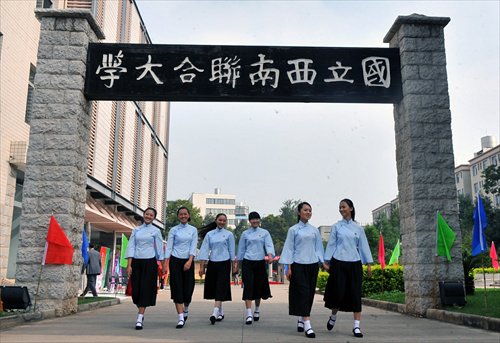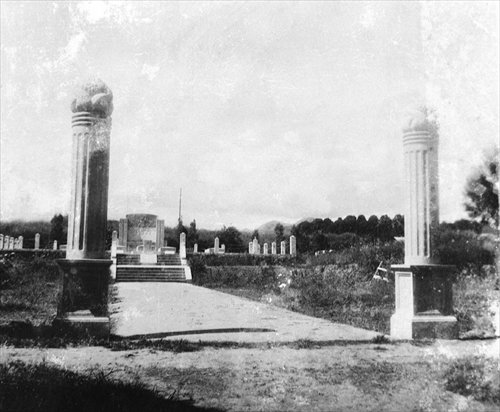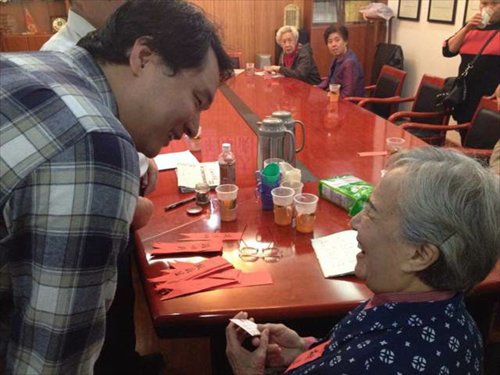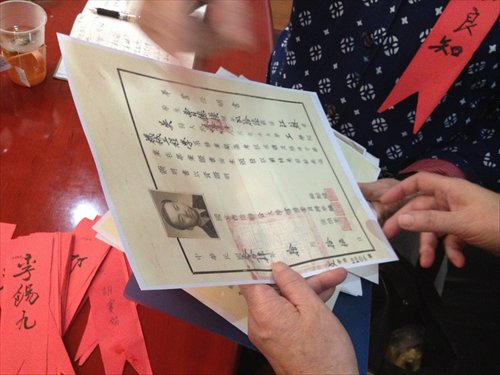HOME >> CHINA, METRO SHANGHAI
Legends of learning
By Yan Liuqing Source:Global Times Published: 2014-12-16 18:23:01
Shanghai alumni recall life at China’s unique wartime university

Students visit the former site of the university. Photo: Xinhua
It was one of the most dramatic periods in the history of education in China. As Japanese forces bombed and attacked universities throughout the country, a select group of academics from Peking University, Tsinghua University and Nankai University traveled to faraway Yunnan Province to establish a university and attempt to maintain academic teaching and traditions throughout the War of Resistance against Japanese Aggression (1937-45).
After the war broke out in 1937 the chosen staff and students from the three key universities moved to Changsha in Hunan, opening the Changsha Temporary University on October 25.
But as Changsha came under attack and was bombed the following year the 800 students and faculty members trekked the 1,600 kilometers west to Kunming. There it was re-established and renamed the National Southwestern Associated University. On May 4 the university opened its doors to students there for the first time. It was not an imposing brick and ivy-walled institution. Under thatched roofs there were 36 dormitory buildings and classes were taught in makeshift buildings and laboratories.
The university motto, "Persistence and Magnificence" reflected the trials, tribulations and triumphs of the staff and students at this unique institution.

The memorial to the martyrs at the university's former site Photo: Xinhua
Unprecedented fame
This university continued to function for just under nine years and saw 3,800 students graduate in that time. Today the university is enjoying an unprecedented bout of fame as scholars and academics from China and around the world seek to tell the whole story.
The graduates of course were scattered through China but after the university was closed when the war ended, the staff returned to the reopened universities in Beijing and Tianjin.

Revolutionary martyrs' graves at the former site of the National Southwestern Associated University in Kunming, Yunnan Province Photo: Xinhua
Once there were some 300 members of the Shanghai alumni but their ranks are dwindling. Most are now aged over 90. In Shanghai recently on the 77th anniversary of the establishment of the National Southwestern Associated University, 95-year-old Wu Dehong gathered with the few other remaining members of the Shanghai alumni of this university and carefully and slowly wrote the motto "Persistence and Magnificence."
The Shanghai Alumni Association of the National Southwestern Associated University was established in 1986 by a former graduate named Lin Zhi. For the early meetings more than 150 alumni from Shanghai got together.
From then the alumni began meeting as often as they could but age began to take its toll. Xia Shiduo, now the head of the Shanghai Alumni Association, summed up the joy of the first reunion and the aftermath perfectly: "What a marvelous party we had at that time. But we can't change the laws of nature. Today most of the alumni can't take part in our activities. Some are bedridden and some have left us forever."
The most recent meeting saw some 20, mainly elderly people attending - there were two university graduates and two who had graduated from the middle school attached to the National Southwestern Associated University. The others at the meeting were mostly family members of former students and staff.

A fan of the National Southwestern Associated University talks with Xu Liangzhi. Photo: Yan Liuqing
An original diploma
With a broad smile, 80-year-old Xu Liangzhi proudly displayed one of the original university graduation diplomas. The diploma belonged to her late husband, who majored in technology at the university, becoming an engineering expert. Sadly he died during the Cultural Revolution (1966-76).
"It's not easy for us to meet here after such a long time and so many ups and downs in our lives," retired English teacher Xu said, struggling to express herself correctly. "But after everything that has happened we are lucky. I always hoped for the best, even in the darkest moments. I believed that everything would be good in the end."
She presented the diploma to the association. These diplomas, carrying the signatures of the three founders of the National Southwestern Associated University, are comparatively rare and much treasured. Many at the meeting looked long and hard at the signatures of the founders and legendary academics, Mei Yiqi from Tsinghua University, Zhang Boling from Nankai University, and Jiang Menglin from Peking University.
Association member Xia Shiduo, a former law student at the National Southwestern Associated University, is still sprightly and alert at 95. Unlike many of his classmates in his second year of study he chose to join the army and enrolled with the legendary Whampoa Military Academy.
"We were such dedicated patriots at that time. Nothing could stop my desire to join the army. I wanted to help save the country," he said.
He said the alumni association was suffering at present - the number of original members was decreasing and there were problems finding appropriate venues, raising money for events and keeping in touch with sick former students.
"Someone once suggested that we should close the association down because all of us are running out of steam but we rejected that idea and will continue to meet when we can," Xia said. The members vigorously opposed any proposal to stop getting together - they wanted to continue this unique link with history.
Some alumni members pointed out that university had a great historical value to the country and it was every citizen's duty to preserve history. Others said people should study the way the university had worked to discover how it had produced so many leading academics in abysmal conditions.

An original graduation diploma from the National Southwestern Associated University Photo: Ding Yuanyuan
Political studies
Taking up the cause of the alumni nowadays are volunteers, mainly children of alumni or former alumni members like Xia Dunyi whose father studied politics at the National Southwestern Associated University.
Alumni member Wu Dehong explained that the university was a treasured part of China's modern history because of the respect the three formative universities had commanded and because of the way lessons were taught there.
The head of the political faculty at the university, Zhang Xiruo, used to tell his students that to study politics properly they should aim to become social revolutionaries. He gave his students considerable freedom to express themselves and in choosing topics for their theses.
Ninety-two-year-old Wu recalled being at a class in mathematical logic given by the distinguished philosopher Jin Yuelin when a student began vigorously debating the philosopher. That student, Wang Hao, went on to become one of the most distinguished professors of mathematical logic at Harvard University.
Wu said one of the strengths of the university was that many of its staff and students had studied abroad and had an international view of the world. As well, staff and students from European universities had exchange visits with staff and students from Kunming.
"It was a diverse method of learning rather than a unified education. The advantage was that with this diversity we were offered a variety of opinions and learned to be detached. The university was not just about freedom on the campus. It was about a lot more than that. The atmosphere of tolerance it promoted bred free thinking and creativity.
"This might have been connected to the war that was raging around us but not necessarily," Wu Dehong said.
Ding Yuanyuan contributed to this story
Posted in: Society, Metro Shanghai, City Panorama